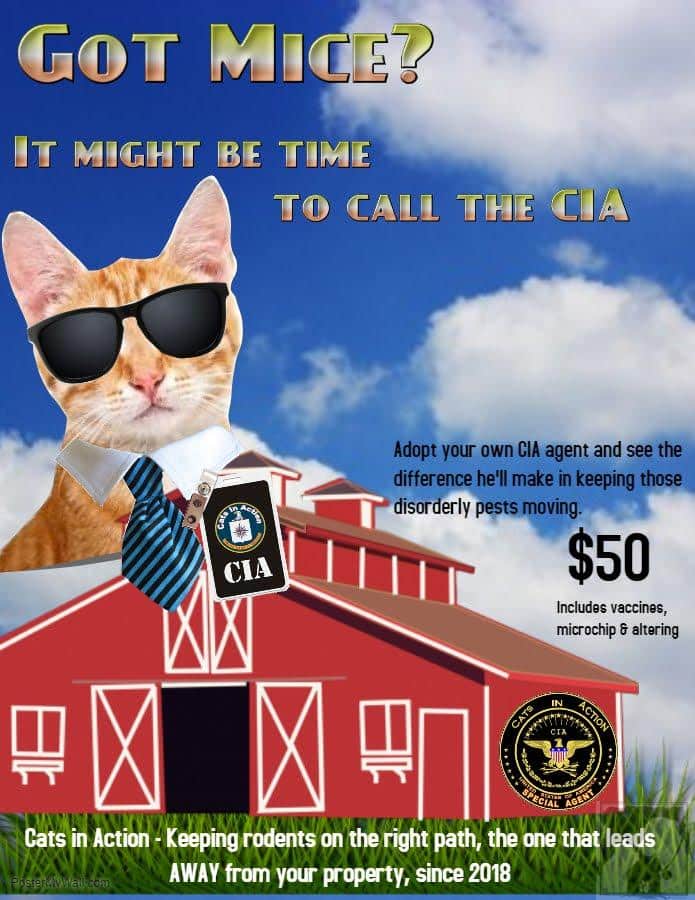Did you know that you can personally hire CIA agents?! Attention farms, horse barns, and cat lovers in rural areas – our Cats In Action program offers you low-wage assistance in keeping your property rodent free while saving a life at the same time! Two different types of AGENTS available for hire:
AGENTS are cats that would prefer little interaction with their human bosses. They’ll provide updates on the rodent population occasionally, but would prefer to do so in passing and not in a personal meeting. They’re not the cats you’ll find hanging out at the water cooler talking about the latest TV shows or workplace gossip.

DOUBLE AGENTS are purrrfect for those in a rural setting that like to have indoor/outdoor cats. They’ve got street smarts and are resourceful, but also don’t mind being included in group activities or team building meetings. They’re just as comfy working in the field or lounging on the couch.
Whichever CIA Agent is the right fit for YOUR place, you’ll find them in our adoptable cats list! Take a peek today to find the right feline for the job!
Already know which Agent is your choice? Submit a CIA HIRING REQUEST FORM(also known as an adoption questionnaire).
Is this a relatively new position at your place? Not quite sure what working conditions you’ll need to provide for your new employee? Check out our CIA Agent Working Conditions guide below.
Looking to adding a working cat to your family? Our CIA Agent cats are less social cats that are perfect for protecting your property or barn from unwanted critters. Because they have different needs than a typical house cat they have their own form with their specific employment requirements.
Thinking of Hiring an Agent but Aren't Sure You're Totally Ready?
Check out our AGENT WORKING ENVIRONMENT GUIDELINES
Your new cat should be set up in a confined area when it first arrives at your barn, for approximately a week. If the barn doors close securely the cat can be confined to the barn, but most people prefer confining the cat to a tack room or feed room. While confined your new cat should have access to a clean litter box (even if the cat will not have a litter box once released), food and water. By keeping your cat in the barn for about a week, your cat will associate the barn as “home base” so that once the cat has free reign of the property, it will stick around, and know where to come for food. If there are other animals in the barn area (like other cats or dogs) it is recommended you keep your new cat separate from these animals for at least a week so the cat can adjust to one big change (location!) at a time.
After about a week of being kept comfortable in the barn or room in the barn, you can open up the area and let the cat explore. We recommend that the first time you give your cat access to the outside, it be daylight so that you can monitor for any problems. It can be overwhelming for your new cat to see the full property the first time with dogs or kids running around, so try to keep the property as quiet and stress-free as possible when you first open the doors.
If you have other animals on your property, your new cat will need time to adjust to living with them give them time! Most cats, given enough time and space, will transition into happy coexistence with other cats, dogs, and even farm animals! Let your new cat and current cats work out their differences sometimes cats need to make noise or scuffle a little to learn their place in a home’s social order- this behavior is normal !
Even though your new cat will be a valuable partner in mouse control, it’s important that you still give your cat access to food and water daily. Cats do not/will not hunt more if you withhold food, so make sure you’re keeping your cat healthy with regular feeding. Routine feeding times/places will also help keep skittish cats from wandering off the property.
Your new cat is up to date on vaccines (FVRCP and Rabies), and spayed or neutered. Your cat has also been treated for fleas and dewormed! We recommend that you continue your cat’s vaccination schedule as the years progress- many “country” vets will often make house calls to vaccinate barn cats on-site. Keeping your cat up to date on shots is an important part of keeping them healthy while living outside.
